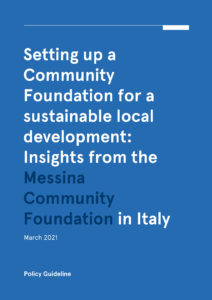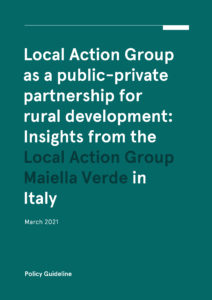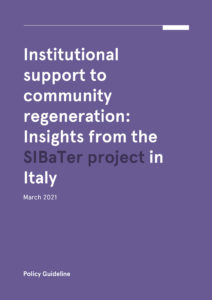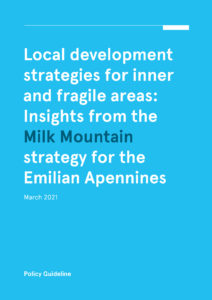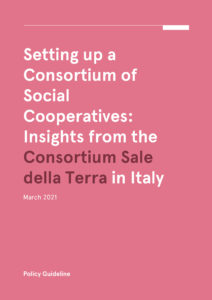The pandemic is widening the structural inequalities that exist within and among countries, not only for the most vulnerable groups of people but also for vulnerable territories, threatening both social and territorial cohesion. Moreover, the pandemic is making evident the interconnections between the social, economic and environmental spheres, alerting us to the importance of achieving the SDGs as the overarching framework for local and national action and international cooperation in the wake of Covid19. Local Development and Social Economy Units, as part of the a UNDP Global Programme – ART Initiative research project, carried out an in-depth analysis of the approach to social and solidarity economy and social and territorial cohesion as drivers for SDGs localization on 6 Italian case-studies. This study has been later translated into 6 Policy Guidelines for LRGs, Local and Regional Governments, to potentially inspire similar practices and showcase replicable models in other countries and local contexts.
The centrality of initiatives of social and solidarity economy and the relevance of policies for social and territorial cohesion have gained momentum as driving forces for more sustainable and inclusive recovery processes in the framework of SDGs implementation. As a matter of fact, social and solidarity economy organisations put social and environmental concerns at the heart of their business model, prioritising social impact over profit maximisation. They are driven by a mission of serving the common good, protecting the general interest and increasing individual and community welfare. All in all, social and solidarity economy organizations are among the main actors which prove to be of critical importance in the process of keeping together the three dimensions of sustainability (economic, social and environmental) at the local level. While, social and territorial cohesion policies aims at ensuring the welfare and basic human capabilities for all members and social groups within a country, reducing the disparities among better-off and lagging territories that are hampering access to rights for all, opportunities for personal development and upward social mobility.
Social and solidarity economy and social and territorial cohesion together act as catalysts of a circular virtuous process through which – grounding on the creation and re-creation of socio-economic value, as well as on the enhancement of people’s agency and empowerment – they are able of transforming territorial inputs (e.g., resources, capacities, relations) into final Sustainable Human Development outcomes. In this regard, Italy has a long-lasting experience both in fostering social economy as well as implementing cohesion policy in its own territories in order to foster Sustainable Human Development at the local level.
SDGs Localization, the Italian experience
Italy’s national and local experiences on both social and solidarity economy initiatives and social and territorial cohesion policies are rather unique and can constitute a useful reference for other countries and local contexts to find their own ways to introduce or consolidate relevant models and practices. Experience-sharing and peer-to-peer learning are extremely important for promoting social and solidarity economy and social and territorial cohesion as drivers for SDGs localization. The diffusion of good practices has the potential to inspire similar experiences and solutions through a multiplicative global effect on local communities.
For this reason, UNDP Global Programme – ART Initiative has commissioned the Local Development Unit, under the supervision of the Scientific Director Prof. Mario Biggeri, the research titled “Study on best practices of Social Cohesion and Social and Solidarity Economy in Italy”. The study aimed at investigating on the relevant experiences of social and solidarity economy and social and territorial cohesion in the Italian scenario. Moreover, it led to the identification of 6 case-studies that can potentially inspire similar practices and showcase replicable models to drive SDGs localization in other countries, according to the following set of 8 selection criteria:
- Capacity to catalyse SDGs localization
- Focus on specific vulnerable groups / communities / territories
- Systemic change
- Multi-actor processes and dynamics
- Multi-level territorial processes and dynamics
- Institutionalization
- Social / transformative resilience
- Potential replicability.
The Policy Guidelines
To inspire similar practices, the in-depth analysis has been translated into 6 Policy Guidelines that explain the adoption of similar models of SSE and STC by LRGs and local actors, counting also on the support by UN or development partner projects. These Policy Guidelines go far beyond a simple descriptive approach, in favour of an in-depth analytical investigation of the key determinants for the effective implementation and replicability of selected practices. For further reading, here are the 6 case study summaries through which readers can access the relative Policy Guidelines.

